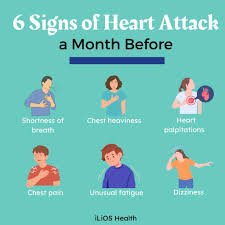A heart attack occurs when blood flow to the heart is significantly reduced or blocked. Usually, the accumulation of fats, cholesterol, and other substances in the arteries causes this reduced blood flow. This accumulation is called plaque, and sometimes it leads to blood clots that obstruct blood flow.
There are specific signs of a heart attack that can help individuals seek immediate medical assistance. While heart attacks often happen suddenly, some signs appear weeks in advance, serving as a warning. Being aware of these early signs increases the chances of quick and complete recovery.
Early Warning Signs of a Heart Attack Some signs, like chest pain, indicate the likelihood of a heart attack and the need for immediate medical attention.
However, there are early signs that may appear weeks before the actual heart attack. According to a study conducted on 515 women, certain symptoms can appear up to a month before a heart attack, including unusual fatigue, sleep disturbances, shortness of breath, and chest discomfort.
The Cleveland Clinic also highlights several early signs of a heart attack that are often overlooked, such as pressure or tightness in the chest, pain in the arms, jaw, neck, or back, cold sweats, chest burning, difficulty breathing, nausea, vomiting, and excessive fatigue.
Common Symptoms Heart attack symptoms can vary in severity from one person to another. Some individuals experience mild or moderate symptoms, while others may have more severe ones. In some cases, no symptoms may appear before a heart attack, and it happens suddenly.
The common symptoms of a heart attack include:
- Chest pain (with a feeling of pressure)
- Fatigue or weakness
- Sudden dizziness, fainting, or mental confusion
- Difficulty breathing
Differences Between Men and Women According to the American Heart Association, chest pain is the most common symptom reported by both men and women. However, women may experience symptoms that are uncommon in men, such as intense pain in the neck, arms, or back, often described as sharp or stabbing.
Who is at Greater Risk? Heart attacks can happen to anyone, regardless of age or gender. However, in recent years, there has been a significant increase in heart attack cases among individuals under 40.
Several diseases and lifestyle choices contribute to a higher risk of heart attack. These include obesity, diabetes, smoking, high blood pressure, high cholesterol, and a family history of heart disease.






 Today's E-Paper
Today's E-Paper